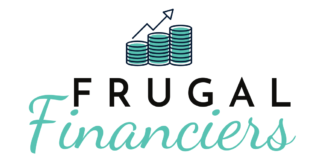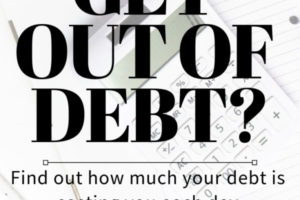The foundation of accomplishing your financial goals and reaching financial is building a budget. The quarterly budget is the perfect way to build that solid foundation.
Throughout our lives, we have used all kinds budgets to set financial goals and keep track of our earnings, expenses, and net income.
We can tell you that writing your goals down and tracking our finances works. It’s how we paid down $100k in 2 years!
After tons of experience with all types of budgets, we’ve seen that budgets come down to two main things: time and categories.
In this post, we are focusing on time and specifically, why you should be using a quarterly budget to achieve your goals.
What is a Quarterly Budget?
A quarterly budget is a budget that uses three months for the budget timeframe.
The year is broken up into four quarters, each with three months.
Here are the quarters:
- 1st Quarter: January, February, March
- 2nd Quarter: April, May, June
- 3rd Quarter: July, August, September
- 4th Quarter: October, November, December
There are many reasons why a quarterly budget is great and is the best budget plan to help you achieve financial peace.
Why Should You Use a Quarterly Budget?
1. Symmetry
We love that quarterly budgets have:
- Roughly the same number of days each quarter (around 90-92 days)
- Same number of earnings payments for our bi-weekly pay dates
- The same number of months
The three bullets all point to the fact that each quarter is roughly the same as the last.
That makes it very easy to compare the previous quarter to the next.
For example, looking at bi-weekly pay dates and monthly budgets, there are some months when you’ll be paid twice and some when you’ll be paid three times.
In addition to making it difficult to compare your net income from the previous month, it also creates extra work planning two different monthly budgets.
With a quarterly budget, the symmetry makes it very easy to compare one quarter to the next.
2. Shorter Timeframe = Focus
We prefer a quarterly budget to an annual or half-year budget because we don’t lose focus.
If your goal is to spend only a certain amount tomorrow, it’s very easy to remained focused on that goal.
But, if you’re trying to achieve spending goals over a long period of time you can easily lose track of your goals and lose focus.
While thirteen weeks can feel like a long time, it is much less time than an annual or half-year budget.
With an annual budget there is the possibility that you spend a good amount of time building your budget and then you store it away to never be seen again.
We feel that a quarterly budget is short enough to be mindful of our spending and savings goals.
Also great, it’s easy to annualize your quarterly budget to determine your annual goals.
It’s difficult to take one month and say use it to forecast how much you’ll spend in a year.
3. Meaningful Results
While shorter timeframe budgets are good for keeping us focused, they don’t always produce meaningful results.
With a short budget, like a week or month, we can quickly see how we did.
However, the results that we quickly generate are not always a great indicator of if we are on the right path.
Think about all those things that you don’t buy every month or make big purchases when you do buy something.
Clothing and beauty supplies may be a good example.
Maybe you only buy clothes every few months but when you do, you go on a shopping spree.
Or maybe you only have to buy make-up and skin care every other month or longer.
There are all kinds of things that we buy but not every week or month.
Meeting a weekly budget is a great accomplishment, but it may not mean that your success is going to continue the next week.
The shorter the timeframe, the easier it is for random or infrequent expenses to skew the results.
We have found that quarterly budgets are long enough to normalize unusual and infrequent expenses.
Additionally, a budget built for a full quarter provides a good foundation to forecast your future budgets.
At 1/4 of the year, we have a good understanding of where our expenses are coming from and areas where you can reduce costs.
4. Seasonality
One of the most difficult parts about budgets are those weird expenses that either only happen once or are so infrequent that when they do, they wreak havoc on our budgets.
Although a quarterly budget can still be susceptible to nonrecurring expenses, it is long enough to normalize some of the unexpected expenses.
It also allows you to plan for seasonal increases (or decreases) in expenses and income like annual bonuses, a trip every summer or holiday shopping.
While it may difficult to compare a month year-over-year due to random expenses, a quarter is easier because the random expenses are less outsized.
And, you can compare quarters year-over-year because of the common expenses and earnings that may happen each year.
5. Quarterly Budgets are Time Friendly
Lastly, a quarterly budget requires less time commitment than shorter budgets.
The shorter the budget, the more often you have to calculate your results.
The longer a budget, the more time you’ll spend trying to remember expense details and categorizing those expenses.
A quarterly budget only requires you to calculate your results four times a year instead 12 or 52 times.
And, the expenses happened recently enough to remember what they were for and where to put them.
Quarterly Budget: The Goldilocks of Budgets
Not too long, not too short. The quarterly budget is just right.
We are able to stay focused knowing that will have results in 13 weeks.
And, we know that at the end of those 13 weeks we’ll have data on 25% of our annual earnings and expenses.
We are able to spend a short amount of time to calculate our results and establish our new goals for the next quarterly budget.
For more on budgets, check out our posts:





Leave a Reply
Your email is safe with us.
You must be logged in to post a comment.